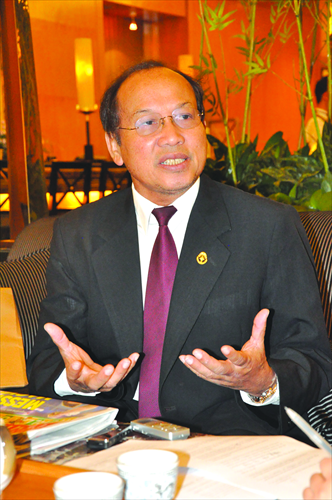Pushing division does not help human rights
Editor's Note:
China has been fostering ties with ASEAN countries, despite maritime disputes with particular nations. Cambodia, as one member of ASEAN, has always advocated a solution within the framework of China-ASEAN relations instead of speculating on the international stage. How does Cambodia view its relations with China? What obstacles does it face in terms of its own development? Global Times (GT) reporter Wang Wenwen talked to Phay Siphan (Phay), a spokesman of the Cambodian government, on these issues.

Phay Siphan (Photo: Gu Di/GT)
GT: China has invested a lot in Cambodia such as constructing roads and building bridges. What are ordinary people's opinions about China's investment? What is the quality of China's projects?
Phay: In terms of connectivity, it used to take a week from the capital to remote provinces and now it takes only about four to five hours. We used to be separated by the Mekong River or Tonle Sap River. Now a number of bridges built by China bring everybody together.
China also helps in our connectivity with Thailand, Laos and Vietnam, putting us on an equal footing with neighboring countries. China plays a major role in our economic growth as merchandise can flow freely.
There are accusations from the US that Cambodia seems to sell itself to China, but this is not the case. Western countries criticize China as a human rights abuser, but I never heard of China sending troops to occupy any country. Instead, I heard about Chinese engineers going to other countries to build roads, bridges and power plants.
There is criticism about Chinese workers and the quality of the projects, but I have seen them shed blood and sweat and live in the jungle. In these cases it is the brokers that took away the money. Corruption also exists among local governments. It's not fair to criticize China.
GT: There have been environmental concerns about the Lower Sesan 2 Dam, which has an investment of $900 million. What do you think about it?
Phay: Cambodia is an NGO heaven on earth. We have thousands of NGOs. Those NGOs are funded by interest groups who are trying to use the dam to put the blame on the government and on China. They don't want to see the Chinese helping Cambodia and wish to brand China as bad in the region or internationally.
Some NGOs are funded by foreign countries which want to keep Cambodia away from development or from assistance from China. They are afraid of China gaining credibility in Cambodia or in the region.
There are many alternatives to help local villagers, but the polarization caused by outsiders makes it difficult. But the government persists. The government gave many explanations to villagers and provided jobs. We pulled them out from jungle to live in modern society thanks to good compensation. We need electricity to light up the schools, residences and hospitals. Do people want to live in the jungle? I don't think so.
GT: Cambodia has supported China in the South China Sea disputes. In the recent Shangri-La Dialogue in Singapore, Japanese Prime Minister Shinzo Abe was trying to woo Southeast Asian countries to form an anti-China circle. Will Cambodia and other ASEAN members follow Japan?
Phay: Cambodia abides by and fully supports the ASEAN mandate because ASEAN, we 10 countries, respect the Code of Conduct (COC) in the South China Sea issue. We stick to the COC.
We encourage dialogues between China and related nations. We still look forward to a cooling-down and more comprehensive atmosphere in order to solve this problem peacefully. Cambodia hopes that third parties will not get involved or interfere in the disputes.
Cambodia played an important role when it chaired the ASEAN summit to promote the COC. We want everybody to sit together and solve the issue peacefully. ASEAN never leaves Vietnam or the Philippines out, but our option is maintaining dialogue. Even if they brought this case to court, they still don't want to create a war.
We don't like any approach that isolates China. We need everyone together. The COC has established comprehensive norms already. They are designed to further peace, friendship and cooperation.
GT: If you used a metaphor to describe the relations between China and ASEAN, what would you say?
Phay: ASEAN's 600 million people, with China's 1.4 billion, become 2 billion people. ASEAN could survive with China in terms of economy and security. China is a big brother in this area. We don't want anyone to be disturbed.
GT: In February, you refuted a US human rights report that accused Cambodia of human rights abuses. Why is that?
Phay: We learned a lot from the West's efforts in Iraq. They spent money and bombed a nation to impose human rights and democracy. How can they say they respect human rights and democracy?
Democracy doesn't mean splitting people away from their own elected government. They have sent a number of NGOs, funded by foreigners, which split people from the government.
Human rights are protected by the rule of law, not by NGOs or a super power.
We have to have competent lawyers, judges, prosecutors and avoid abuses of law.